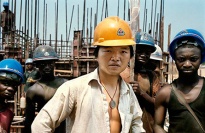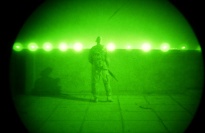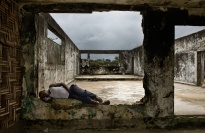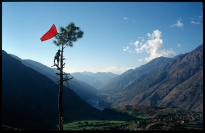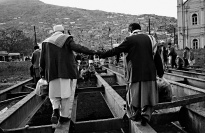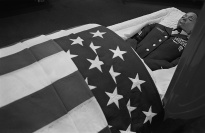About Moving Walls 16
The Open Society Foundations’ Moving Walls exhibition reflects issues of importance to Open Society around the world but is not organized around a single theme. The 16th exhibition of Moving Walls is dominated, however, by themes of war, conflict, and their aftermath.
Half of the exhibition addresses the United States military engagement in Afghanistan and Iraq, focusing on the perspective of the soldiers and civilians whose lives are directly affected by these wars. Zalmaï returns to his home country, Afghanistan, to find that the promise of democracy has not been fulfilled. Whatever hope Afghans had for their country in 2002 is being destroyed as innocent Afghan civilians get caught in the crossfire of yet another bloody battle being fought on their land. Zalmaï turns his lens on the personal to remind viewers of the human cost of war.
Benjamin Lowy documents war-affected civilians from the viewpoint of American soldiers in Iraq. His photographs—shot through the small window of a U.S. Army Humvee or night vision goggles—explicitly depict the American soldier as an outsider. Lowy’s technique emphasizes the distanced perspective of the soldiers fighting in this foreign place while showing how profoundly separate and frightened the Iraqi people feel as they go about their daily lives.
Eugene Richards, on the other hand, shifts his camera away from the site of conflict and explores what becomes of U.S. soldiers when they return home from Iraq. Many come home physically or mentally wounded—or some come home dead. Each soldier or surviving relative has his or her own heartbreaking story and each story is individual because, as Richards explains, war is personal.
The theme of conflict is also addressed by Tomas van Houtryve in his documentation of the Maoist revolution in Nepal which, improbably, overthrew a centuries-old monarchy in 2008. In its aftermath, the revolution is replaced with a fragile democracy.
Like Richards, Stefano De Luigi examines soldiers’ attempts to restore their lives in the aftermath of war, but in a different context, Liberia’s civil war. He documents a community of former child soldiers who are now living on the beach near Monrovia. By bonding together and moving through the routine of a simpler life, they attempt to forget the past and reclaim a lost innocence.
Africa’s relationship to its troubled history is evident on a broader scale in photographs by Paolo Woods. His photographs portray the wave of Chinese state companies and business people who have gone to Africa to stake a claim in its resources and make fortunes. By consciously using visual tropes from the colonial era, Woods draws connections between China’s involvement in resource extraction and development in Africa, with colonial activities of the past.
